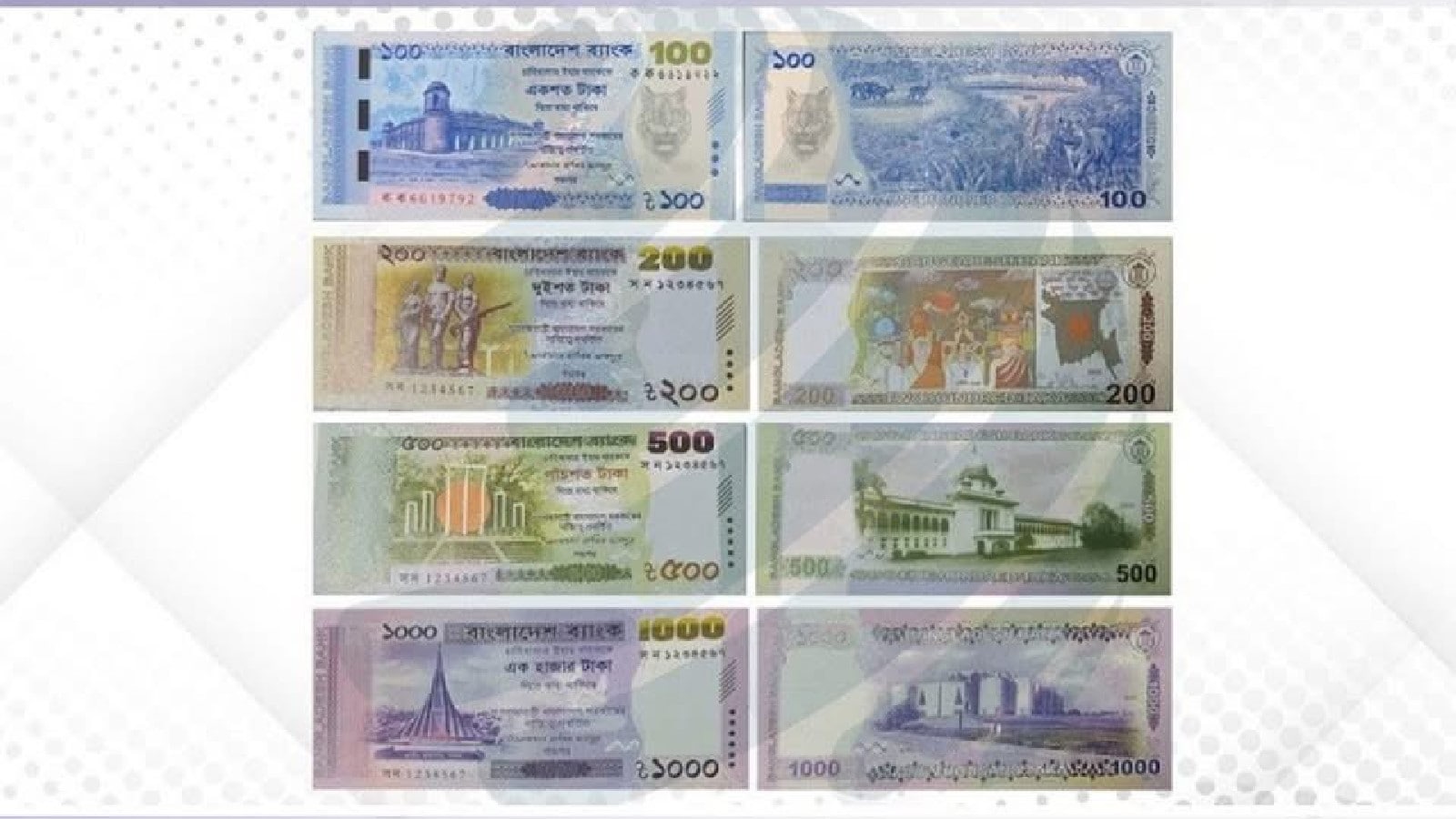Last Updated:
On Sunday, Bangladesh issued new banknotes that no longer feature the portrait of Sheikh Mujibur Rahman.

Bangladesh will replace banknotes featuring the late Sheikh Mujibur Rahman’s portrait. (BD24NewsLIVE)
Bangladesh has recently issued new banknotes that no longer feature the portrait of Sheikh Mujibur Rahman, the nation’s founding president and father of the ousted Prime Minister Sheikh Hasina. Sheikh Mujibur Rahman had led Bangladesh to independence from Pakistan in 1971 and was assassinated along with most of his family in a 1975 coup. The new banknotes will now feature traditional landmarks of the country, marking a significant departure from the past designs.
This move is seen as another attempt to diminish Mujib’s legacy under the regime of Muhammad Yunus in Bangladesh. Sheikh Mujibur Rahman, a pivotal figure in Bangladesh’s independence movement, has faced both symbolic and institutional challenges, especially during periods of intense political tension involving Muhammad Yunus, the country’s chief adviser.
Recurring Attacks on Mujib’s Legacy
Mujib’s symbolic significance has faced several direct attacks. One of the most notable incidents occurred in December 2020 when a sculpture of Mujibur Rahman was vandalised in Kushtia. This act was widely condemned across the political spectrum and perceived as an insult to the nation’s founding values.
Joy Bangla
The use of the “Joy Bangla” slogan has also been a contentious issue. In March 2020, the High Court declared “Joy Bangla” as the official national slogan, underscoring its deep connection to the Liberation War. However, some political and civil society figures, often linked to non-partisan or oppositional circles, have refrained from using it in official forums and public speeches. The government criticized this reluctance as an intentional effort to erase Mujib’s legacy. Although Yunus did not speak against the slogan, his broader circle—often depicted as “elitist” or “detached from 1971 values”—was accused of enabling this cultural disengagement from the Liberation War’s ideological core.
Legacy Wiped Off From Textbooks
Controversy has also surrounded textbook revisions, with critics alleging efforts to minimize or omit references to Mujib’s role in Bangladesh’s history. The interim government has revised textbooks on the 1971 Liberation War to state that Ziaur Rahman declared the country’s independence, replacing the previous text that credited Sheikh Mujibur Rahman. The National Curriculum and Textbook Board (NCTB) of Bangladesh has made revisions to 441 textbooks used by primary, secondary, and higher secondary students. Over 40 crore textbooks are being produced for the 2025 academic year, as reported by The Daily Star. The new textbooks, with several changes, have been distributed among primary and secondary students since January 1.
Mujibur’s House Vandalised
In early February 2025, Bangladesh witnessed a significant act of political unrest when protesters vandalized and set fire to the historic residence of Sheikh Mujibur Rahman. This residence at 32 Dhanmondi in Dhaka is where Mujibur Rahman declared Bangladesh’s independence in 1971 and where he was assassinated in
The house had been converted into a museum by his daughter, former Prime Minister Sheikh Hasina. On February 5, 2025, thousands of protesters gathered outside the Dhanmondi residence in response to a social media campaign called the “Bulldozer Procession.” The protest coincided with a virtual address by Sheikh Hasina, who is in exile in India following her ousting in August 2024. As Hasina began her speech, demonstrators stormed the property, dismantled parts of the building, and set it ablaze. Heavy machinery, including cranes and excavators, was brought in to aid in the demolition.
Currency Revamped
On Sunday, Bangladesh issued new banknotes that no longer feature the portrait of Sheikh Mujibur Rahman. Instead, the new notes will showcase natural landscapes and traditional landmarks of the country. “Under the new series and design, the notes will not feature any human portraits but will instead showcase natural landscapes and traditional landmarks,” said Arif Hossain Khan, a spokesman for Bangladesh Bank, to AFP. The notes for three of the nine different denominations were released on Sunday. “The new notes will be issued from the central bank’s headquarters and later from its other offices across the country,” Khan stated. Among the designs set to feature in Bangladesh’s new banknotes are images of Hindu and Buddhist temples and historical palaces. They will also include artwork by the late painter Zainul Abedin, depicting the Bengal famine during British colonial rule. Another note will show the national martyrs’ memorial to honor those who died in the independence war against Pakistan. The other denominations of the notes will be released in phases.
What Next
The conflict is likely to intensify as multiple legal cases against Yunus progress through the courts. Allegations include violations of labor laws, improper handling of employee benefits at Grameen Telecom, and ongoing investigations by the Anti-Corruption Commission (ACC) into alleged financial misconduct. In 2023, a group of employees filed formal complaints against Yunus and his associates, accusing them of withholding mandatory worker benefits. The Labor Court took cognizance of the charges, and the case is moving forward. Separately, the ACC has launched inquiries into potential misuse of donor funds, increasing legal pressure on the Nobel Laureate. If the courts rule against Yunus, it may not only affect his personal reputation but also reinforce the government’s narrative about protecting national ideology.
Meanwhile, with elections overdue, Bangladesh is facing political uncertainty. Sources have told CNN-News18 that Bangladesh Army Chief Waker-Uz-Zaman is determined to explore all options to remove Yunus from power. Sources say Zaman is considering various avenues, including exploiting constitutional ambiguities, to challenge Yunus’s interim government. Intelligence sources highlight that the interim government’s legal basis is fragile, as Bangladesh’s constitution mandates elections within 90 days of a government’s dissolution. Zaman plans to unite the parties of Sheikh Hasina and Khaleda Zia to contest elections for the country, according to sources.
The News Desk is a team of passionate editors and writers who break and analyse the most important events unfolding in India and abroad. From live updates to exclusive reports to in-depth explainers, the Desk d…Read More
The News Desk is a team of passionate editors and writers who break and analyse the most important events unfolding in India and abroad. From live updates to exclusive reports to in-depth explainers, the Desk d… Read More
- First Published:




